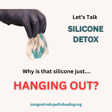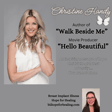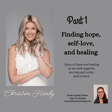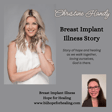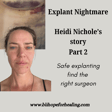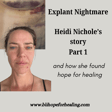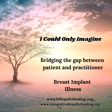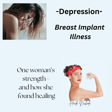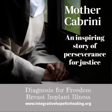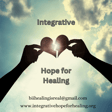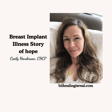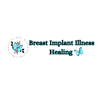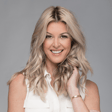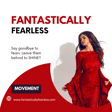Become a Creator today!Start creating today - Share your story with the world!
Start for free
00:00:00
00:00:01

Christine Handy--Finding hope, self-love, and healing Part 2
Christine Handy shares her role in the documentary "Sicklicone", and helps women know they are not alone. Her story of Breast Implant Illness is one of terrible circumstances, but she uplifts and tells women to give themselves "grace" and love. Share your story to the world and you will serve others. https://christinehandy.com/
Transcript
Introduction to Breast Implant Illness
00:00:04
Speaker
I know that you are also doing things for the breast implant illness community. Yes. I think you just got done doing a film ah for or your part in filming a documentary called cyclicone. Yes. Hello, please. Can you can you elaborate a little bit on that?
Angeli Manieko's Personal Journey
00:00:26
Speaker
So um and of South American, very famous actress, her name is Angeli Manieko, beautiful, spirited woman. And she had breast implants from a young age. I think she said she was 16 or 17, which is very typical in the South American culture. According to her, I'm obviously not South American. I can't speak for her, but these are the stories that are part of the film. And it was not only ordinary, it was expected.
00:00:54
Speaker
And especially because she was an actress and that was, you know, part of her job was to look a certain way like mine as a model.
From Acting to Advocacy
00:01:00
Speaker
Ultimately, she had breast implant illness and she, after that experience, left the acting space to fully commit to this movie, to making this documentary. She and her husband and a couple other people are intimately involved. She's the main story. It's called cyclocone. And then they have characters, they have other stories in it. Ironically, this project started a couple of years ago. Ironically, when it was pretty much wrapped, almost done filming, I think they had already filmed all the characters.
Christine Handy's Contribution
00:01:31
Speaker
Somebody had said to her, you know, you might want to call this woman named Christine Handy because she had breast cancer and breast implant illness. All the characters in your story, in your film, only had breast implant illness. And that's a different, for sure, a different visual, right? I lost my implants and I don't have a concave chest.
00:01:50
Speaker
people who have breast implants that did not have breast cancer have their own breasts. And so she so she called me up and she said, would you be willing to to partake in this story? And I said, yes. And it matters because as an example, when I was technically never diagnosed with breast implant illness, I don't know that That's, I don't know, and um I don't know. They never diagnosed me as that, but I had breast implant illness. What they kept saying was, i you know you had a lot of chemo, your brain is still foggy because, ah yeah gosh, all that those years ago, that chemo really, it kind of sticks
Challenges in Medical Recognition
00:02:30
Speaker
around for a while. And I was like, gosh, it seemed like a long time ago. Oh yeah, that joint pain, that's probably from this particular chemo drug or this particular breast cancer drug.
00:02:40
Speaker
Yeah, I don't think so. It's so long. Yeah, that swelling in your area, that redness. Yeah, it's just fine. We're just going to give you some antibiotics. It's going to go down, and that tenderness, it's going to heal. and And I was like, okay. Again, thinking these are the doctors. I didn't go to medical school. I probably should at this point. And ultimately, I was in and out of the hospital in 2020. during COVID and ultimately I developed a MRSA infection in that implant. And I literally almost died and we had a major um evacuation of that implant and my chest in an emergency situation. And the next day I'll never forget I woke up and I had like five physicians around me and they were double masked and I was alone because it was June of 2020.
00:03:33
Speaker
And they were they said, we want to unveil you know the wrapping and all the the sutures. We want to take a look at it. And they said, do you want to see it? And I said, I kind of batted away tears because I didn't want them to see me vulnerable. ah These people I would never see again in my life. And I said, no, I don't want to see it until I'm home with somebody that loves me. And I mean i remember that they all had masks on. I remember seeing one of the doctors. And I could tell that he was kind of wiping away tears. It was such a sad moment. But those types of moments where you unveil the catastrophe of a medical device that was not meant, not supposed to hurt me, maybe it was meant to and I didn't know it, those are intimate, intimate moments. And they shouldn't be feared or alone or dismissed or
00:04:27
Speaker
you're told that you're not telling the truth or all these things that women are going through because they don't really classify it as they don't really think of it as that. It's it's ah it's a heartbreaking thing. And when things keep you up at night because they're heartbreaking, those are the things you should work on.
Community Support for Breast Implant Illness
00:04:46
Speaker
And so when I think about being dismissed by doctors about my implants and I think about other women going through that, It keeps me up at night. So that means I have to work on that. I have to give people hope. I have to show people that they are not alone. And so that's why I'm working on that project.
00:05:02
Speaker
Thank you so much. We we need that. we We need people to stand up for these women. And i I talk to a lot of women every day that are going through the same thing. they Either they're scared to explant, they're going through all the terrible symptoms, um or they've explanted and they're still sick because they don't have any guidance. It's just heartbreaking because they're alone. And their families are telling them, there' you're you're supposed to be getting better. it's no so It's all in your head. Or the doctor's saying, there's no such thing. And I know that's why we're working really hard you know to get this march going for the ICD-11 code. um Because in that way, at least doctors, can that women can have a um a diagnosis. yeah And medical professionals can you know take care of them and
00:05:52
Speaker
and at least give them some care. But you know until it's actually recognized as ah you know an actual illness, I don't think women are going to get the care that they need. and for the that Yeah, exactly. And it's so difficult because a lot of women can't afford to explant. it's It costs a lot of money, ah more money to explant than it does to even put breast implants in. Right. So it's it's just a really difficult situation. And thank you for your advocacy for for speaking out. um I know that you know you've gone through so much in your life. You've overcome all these terrible things against all odds and going around inspiring others.
The Power of Community and Outreach
00:06:35
Speaker
And what would you tell women who are very sick and feel like they just can't keep going on? What would you tell them?
00:06:45
Speaker
Well, I mean, there's so many things. I mean, I remember thinking that too. I was in that space. And you really need to find people. You need to have people in your life. This is more for people who have never gone through illness. You have to have people look around. And if you don't have people that will stand by you through a lot of stuff, find different people. But if you're in that space and I would say reach out to people, ask for help. And a lot of us don't because there's this stigma in society that women, well we can do everything and we don't need help. And you know we're just, you know hear me roar. And well, that's all true, but we do need help. you know It's even biblical. it's you know Jesus was never by himself. ah you know He was always in a community of people and he always wanted to nurture those communities of people.
00:07:37
Speaker
regardless of who people were in society. And so if you get rid of that pride and that ego and just say to yourself, okay, you know what? I'm down to nothing. God's up to something. I need help. Then stand on that. Don't stand on this. Like, I should be able to get through this. I should be able to muscle it emotionally myself. You don't have to. You don't have to. Thank you. That's beautiful. That's perfect. Perfect advice for us. I i know that i I would not have gone through or I wouldn't have gotten through without my angels, right? The people, my my sisters, I have six younger sisters and I would not have gotten through it without them.
00:08:21
Speaker
so Well, the other thing that I think is so important is to give yourself grace. We so freely give grace to everybody in our life, you know, especially as women, we don't give ourselves the grace we so often deserve before we give it to other people. So I think that that is an important reminder, give yourself the grace to just acknowledge that you're going through some despair, you feel alone, you feel duress, It doesn't make you less than, it just makes you human. There's so many other people that feel that same way. And it's about stories and and podcasts and interviews like this where you go, we have to be out here doing this for those people who are feeling that duress because they shouldn't feel like they're alone. But we paint this picture in society, it's just distorted.
00:09:17
Speaker
Yeah, absolutely. I agree. It's it's very frustrating. It's hard going through that and then seeing other people go through that.
Nonprofit Initiatives and Film Projects
00:09:25
Speaker
Yeah. Well, I um wanted to, I guess, just talk a little bit about your nonprofit efforts. um when is your Do you know when your movie's coming out or any idea? um The movie Hello, Beautiful is coming out, we believe, next fall. you know it's really It's in a lot of other hands, and including you know God.
00:09:50
Speaker
So that is the goal. Hello, Beautiful is of also a fictional depiction of my life. And again, it was it's predicated on the fact that when I was searching out media, when I was going through breast cancer, big Hollywood films came out, right? like Didn't come out then, but I watched them, Steel Magnolias, which deals with illness, and Philadelphia, which deals with illness, and Terms of Endearment, and Stepmother, and the list goes on and on. And although those are really brilliant and beautiful stories, they all end in a funeral. And I had righteous anger about that. I thought, man, if I can get my film made somehow some way, maybe I can, if somebody is seeking out a movie about breast cancer, they can seek out a movie that has hope.
00:10:34
Speaker
And so ultimately my movie is going to come out because the world needs hope. And the nonprofits that I'm involved in are a people of purpose, which I started with an inmate that I worked when I went to speak in his prison. He
Empowering Women Through Collaboration
00:10:48
Speaker
yeah actually got out of prison and he reached out to me on social media and he said, The rate of recidivism in Palm Beach County is 97%. He said, I need you to help me change that. And so we started a nonprofit five years ago together, and now we have this incredible board of directors, including not my, I am on the board, but I'm not including myself. He does all the work and so do these other people.
00:11:11
Speaker
but So that's the one we, again, what I said earlier was, whatever keeps you up at night, you should work on that. Prisoners kept me up all night. I wanted to go in prisons and give them hope too. so um And then I'm also on and on the board of a ah another nonprofit called the Wonder Woman Initiative. And it's really ah a way to showcase incredible women around the world who are doing amazing things. I was actually chosen as one of their recipients a few years ago, and then they asked me to be on the board.
00:11:42
Speaker
And then, one oh my gosh, God is working in your life, dear. And then I'm also um on ah on a fashion board out of New York, which is basically fashion and mental um ah fashion meets mental health. And so we're trying to you know help people in that both of those spaces. so I love that. that can How can people look up your nonprofit? Is it on your website?
Digital Presence and Advocacy Projects
00:12:13
Speaker
Yes. So my website is under construction, but it's still out there. It's just doing some changes. It's updating with the film. But yes, all my nonprofit work is is out there, is out on my website. And I think if you i think if you put me on Google, some of that stuff will come out. Come up.
00:12:29
Speaker
but Yeah, I i did so i actually um looked over your website. It's beautiful. so i well i wouldn have I wouldn't have known that it's under construction. Well, you don't know it, but I'm telling you because a lot of my modeling stuff's not on there. I'm taking out all of the press, like all of the interviews, like NBC, Fox, all of that's coming off. i you don't need it on on I don't want to know my website anymore. I don't need it. I want my modeling. I want my book. I want my the movie. I want my nonprofits. That's it. I don't need all the interviews I've done because
00:13:06
Speaker
And not that I'm, you know what, I take it back. We should be showcasing what we do because we should be our biggest advocates. If we're doing good in the world, we should be more proud of that than anybody. And I totally believe that. But I think that the purpose of my website is is not it's not a trophy. It's just a landing page where if people want to know more about me, this is what I do. That doesn't necessarily need, they don't need to see that I was on Fox News or CBS, all those things. That's not what's important. That's just amazing, Christine. i I just appreciate it and appreciate you writing this beautiful book that brought it to my heart. And so I know I purchased mine on Amazon, but I'm sure that if women want to purchase this, you they can go to your website or I know that you get on a Kindle. ah Yeah. Yeah. It's pretty much sold everywhere. I think even at Target. So it's out there for sure. My publisher is very happy.
00:14:05
Speaker
That is always a good thing. Right. Especially because it was published in 2017. It's not a new book. It's still going. Yeah. i That's just amazing. I had no idea it was back in 2017. Yeah. That's when I published it. But that's when it was published. Yeah.
Inspiration and Confidence Through Scars
00:14:24
Speaker
We need to get this out. This is just amazing. so And interestingly enough, there was somebody that was working walking in Milan Fashion Week this past season and she has a scar on her face and they said how did you get the confidence to model she's beautiful young and she said there is a woman in the United States named Christine Handy and she is the one that inspired me you have no idea who you're inspiring you know so amazing every single one of us has a voice even if we have just a whisper you still have a voice
00:15:03
Speaker
And then the next day it might be a bigger whisper and on and on and on. Use your voice. You have one to use it. We are a gift to the world. We should help other people. That is a privilege that all of us
The Impact of Storytelling and Voice
00:15:21
Speaker
have. We can focus on that or we can focus on what we get. It's so much more joy by giving out.
00:15:30
Speaker
Wow, Christine, thank you for the inspiring words. I feel like I've had a feast today and that the the upliftment and the light that has come from you. Thank you so much. and I just feel very honored and to have you today. Well, again, storytelling is unifying. So we're here to unify. Absolutely. Well, I just appreciate your advocacy efforts, your kindness and love, and for sharing your personal story with us, giving us words of hope. Thank you. Thank you. And thank you to those who are joining us on this podcast. Always remember, there's hope for healing. Christine, God bless.


